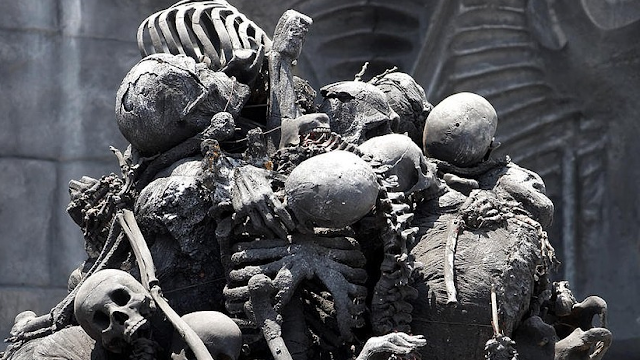Why do people love horror? It seems like a bland enough question; we might as well ask why people like kimchi, or ghost peppers. Humans are endlessly delighted by stimulation, and as even a casual fan of BDSM can tell you, sometimes pleasure is sweeter when it’s been spiked (so to speak) with a little pain. Is that all it is? Are fans of horror indulging our taste for having our neurons flogged? Are horror nerds high on adrenaline the way an extreme sports enthusiast or roller coaster fanatic is? Or is there a deeper attraction – cold metaphorical bones beneath the twitchy flesh of scares-as-thrills?
In some cases, scares are just harmless fun. I clearly
remember – from the days before the plague- the feeling of watching a horror
movie in a theater on Friday night: the giggles, the whispers, and the collective
feelings of tension and release. And while we’re on the subject of tension and
release, it’s worth noting in the era of “Netflix ‘n chill” that the use
of horror
film as an aphrodisiac has a long and storied history, and with scary
fare streaming in the comfort of one’s own bedroom, there has never been a
better time to snuggle close with a loved one and let horror work its magic.
There’s nothing wrong with going to a horror movie with your friends (once
COVID has been brought under control) – and certainly nothing wrong with
watching one with your spouse or partner. That’s all well and good.
It’s worth narrowing the focus of the question and personalizing it, then. Why do I love horror? The answer to that question is a little more complex. Since before my adolescence, I’ve been attracted to the morbid, monstrous, and fantastic in fiction – not unusual for a human produced by the decades that saw Stephen King, Wes Craven, and even RL Stine rise to hyper-fame. I wasn't just a casual fan, however. My love of horror was hatched early, and as I fed it a steady diet of novels and movies it grew into a constant companion. At this point, some time in my early teen years, I began to notice something about the horror fiction that so moved and engrossed me.
Spicy food reacts the way it does on our tongue due to notably high levels of compounds that, interestingly enough, actually hurt us. Unlike the ordeal of the gom jabbbar, the pain produced by a ghost pepper is real because the harm is real (although temporary and intentionally self-inflicted). Eat one, and the chemical compounds it holds in its benign-looking flesh go to work on your tongue just like battery acid would. Spicy food allows us to experience in a safe way the same neurological effects we would get from being, say, burned alive. In a sense, food that bites back is a sort of culinary Maraṇasati, a lip-sizzling sensory version of the funerary thread of the Tibetan Buddhist Great Perfection.
Maraṇasati ("death-mind") is the Buddhist practice of awareness and contemplation of death. In its recognition of human frailty and the finite nature of our bodies, Buddhism (in my personal opinion) comes very close to the mark when it comes to the reality of the human condition. Regrettably, like most major world religions Buddhism teaches that we survive death, in a sense, by reincarnating through the transmigration of something called a "soul." Even so, from
Just as spicy food allows us to physically embody pain and
destruction, to feel as though we are being burned alive when we are not, a
gory, nihilistic horror film allows us to experience in a safe environment the
bodily trauma that will one day happen to us, whether before or (perhaps, if
we’re lucky) after we expire. Horror presents us with a truth that
would be unspeakable in other contexts: the truth of meat.
By “the truth of meat,” I mean the nasty, blood-and-guts nature of human existence, the all-too embodied body. When we watch a monster decapitate and munch on a hapless villager, we are presented with an image – a shadow – of our own inevitable destruction, the total dissolution of our self. We can experience outside of ourselves what we will experience in reality and in ourselves only once. The reason, in short, that I love horror is because it has allowed me to confront my fear of death and nonexistence in a direct, visceral way before I am presented with my own terminus.
So drench your nachos in ghost pepper hot sauce, feel the
burn, and watch some helpless teenagers get torn to bits by a demented
psychopath. There’s nothing wrong with you (at least, nothing that isn’t also wrong with me and a great many people). You’re just smart enough to rehearse and to mentally and
physically prepare yourself for the inevitable.






Comments
Post a Comment